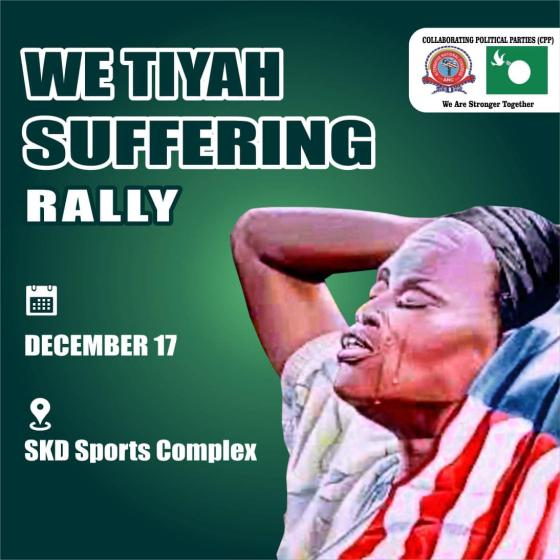Liberia: Protests Are Part of Thriving Democracies

— The case of CPP
It is an uncomfortable truth but the fact here is that the planned protest by the Collaborating Political Party is in the interest of the country and its democracy. Logic dictates that in a democratic society like ours, the voice of the people must be heard by those in authority, and protest is one such medium.
So any arbitrary restriction on the exercise of such right, as was being urged by some people within the ruling Coalition for Democratic Change, would have been an affront to the very people in whose name the ruling party is allowed to govern for these six years.
Thankfully, though, such is not the case as the CPP rally will now go ahead on December 17 without any concern of government censorship. This illustrates how much Liberia’s democracy has evolved, with the right to protest now a vital aspect of our democracy.
For those who may not be aware, Liberia’s constitution is the product of the blood, sweat, and tears of those who struggled — protests and peacekeepers included — for democracy; hence the idiom, “freedom is not free.” The spirit of freedom makes Liberia a democratic state, and that longing for freedom is the underpinning of the Liberian Constitution. And there are those who cherish it so much that they are willing to do anything to defend it.
This could be in the form of political struggle, which is why the Liberian constitution encourages active, rather than passive, citizenship. The constitutional clause that provides for freedoms of speech, of the press, of thought, of religion, of association, and others, are the fertile ground on which democracy grows and flourishes.
But even where democracy grows, it requires the pruning of wisdom and understanding to manage its growth. Like any vineyard, or farm that is planted, democracy must not be allowed to get out of hand.
Once freedom has been acquired, it is not easily taken away from those who know its value. But it takes the degeneration of generations corrupted against the rule of law and the righteous norms of civilization, that allow freedom to be taken away. In this sense, it is not really ‘taken away,” it is given away.
This is why passive citizens attract authoritarian leaders, where irrational laws, policies, and procedures impede and circumscribe the right to protest and other democratic values.
So it is a balancing act, in a way. Parents tend to discipline their children by curtailing their freedoms so that they would be “trained up in the way they should grow.”
But it is not the job of governments to be the parents of society. As governments uphold the rule of law without fear or favor, societies will follow suit and mature to the degree that lawful behavior and stewardship in and out of government become a requirement and a jealously guarded norm.
Thus, we as Liberians should be wary of sitting back and leaving the work of vigilant watchdogs to the activists cum politicians. We need to do our part by speaking our part, freely — be it about unfair or unjust policies, and laws or the way our society treats its most underrepresented members.
Our democratic values are the cluster of interrelated political rights (expression, association, assembly, petition, and protest). Because of these freedoms, we can express our opinions on the conduct and performance of the government even if they are working in our interest and that of our national values — whatever they may be.
These rights make Liberia a democratic society. So we should not sit and allow a few people with self-seeking interests to threaten our interrelated political rights. Doing so would be an insult to those who sacrificed their lives for the freedoms we enjoy today.
To the CPP, invoking the right to protest as guaranteed under Article 20 of the Liberian Constitution comes with great responsibility to abide by the rule of law and demonstrate the quality of leadership demanded of the very government whom you are addressing.
And to the Liberian government, your responsibility to respect, defend, and protect the exercise of such rights is no less required.
On this note, I say, Protests Are Part of Thriving Democracies; therefore, the right to protest and all of its accompanying rights must be protected by all, government and citizens, no matter what.
About the author: Robin Dopoe is the Senior Editor of the Daily Observer newspaper and an ambassador of the Liberia Intellectual Property Office. Editor’s note: The views expressed in this commentary are solely of the author and do not necessarily represent that of the Daily Observer newspaper.
